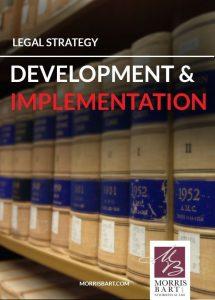
No. A lawyer cannot, under any circumstance, settle your case without your consent. Furthermore, doing so would be an ethical violation. According to the American Bar Association Model Rule 1.8, your lawyer must inform you about the settlement terms before an offer can be accepted.
As a client, you have the final say about whether you want to settle your case or go to trial. It is your lawyer’s responsibility to present you with both options and provide clarity, legal interpretations, and recommendations to help you make an informed decision.
The Legal Process for Settling Cases Can Be Complex
Many lawyers wait until the plaintiff has reached maximum medical improvement (MMI) before recovering damages—all within the statute of limitations, of course. This is because until the plaintiff reaches the MMI, it may be difficult to establish the total amount of a plaintiff’s damages.
Once the lawyer has a good idea of what the client’s total damages are, they will confer with the plaintiff, provide options, and make recommendations. If the plaintiff decides to move forward with the settlement, the following will take place:
After the Discovery Process
In smaller personal injury cases, your lawyer may skip filing the lawsuit and instead write a demand letter to speak directly to the defense lawyer. If the defense thinks the demand is appropriate, they may agree to settle.
However, if they think it is too high, they may respond with a counteroffer and begin to negotiate or ignore your demand altogether. In the case that both parties do not agree on an amount, the case may move to mediation.
Mediation
In the mediation process, a neutral third party—typically a private mediator or a judge who has not been assigned to the case—helps both parties resolve the case.
To begin, the mediator meets both parties to establish ground rules and confirm what has happened with the case thus far. The mediator then meets with the parties and their attorneys separately.
The goal here is to confer with each side and see if they can agree on an amount that works for both sides. Depending on the details of the case, mediation can last a few hours to days.
Settling the Case
Before the case can settle, the plaintiff must first accept the settlement amount. When this happens, their lawyer will let the defense know that their offer has been accepted. This can be done via email, phone, or letter.
There is a rule about accepting settlements: Once the plaintiff tells the defense that they have accepted their offer, there is no going back—not even five minutes later. Therefore, lawyers make it a priority to explain the terms of a settlement before the plaintiff makes a decision.
Your lawyer will describe the payment details, the amount of money, release of liability, and confidentiality clauses. But your lawyer cannot settle without your consent.
For a free legal consultation, call 800-537-8185
Here Are Some Reasons Why Some Settlements Take So Long
Though many cases settle without requiring a trial, reaching a settlement is not always as easy as it sounds. Personal injury cases can take quite some time to resolve or settle. There are a few reasons why settlements may take longer than expected.
You Have Not Reached the MMI for Your Injuries
Lawyers might prefer to wait until you have made a complete physical recovery before settling your case. This way, they can have a better sense of your damages, including:
- Past and future medical expenses
- Pain and suffering
- Any present disabilities
The Defense May Be Trying to Stall Your Case
In an ideal world, the liable party and insurers would own up to their negligence and settle. However, that is not often the case. The defense party might use delay tactics and try to get out of paying any sort of compensation.
The Case Has Legal or Factual Issues
Your case may take longer to settle if certain details are contested, such as how the accident happened. If the court system has backlogs, this can also affect how quickly the case moves through the process.
What Happens If I Refuse to Sign a Settlement Agreement?
You are not obliged to sign a settlement agreement. If you don’t think your settlement offer is reasonable, talk to your lawyer. You may be able to negotiate for a more favorable outcome. If both parties cannot agree on a satisfactory settlement, your lawyer can bring the matter to court.
Click to contact our personal injury lawyers today
Can I Back Out of a Settlement Agreement?
After signing a settlement agreement, you typically cannot back out of the deal. That’s why your New Orleans personal injury lawyer will make sure you understand and obtain consent for a settlement before accepting an offer.
Under special circumstances, you may be able to back out of a settlement agreement. If it has not been incorporated into a court order yet and both parties agree, a settlement can be voided. You can also seek to void a settlement agreement if fraud took place.
Can a Settlement Agreement Be Modified?
Your settlement agreement can be modified. However, you must be able to prove that circumstances have changed significantly. A modification may be granted if:
- Settlement requirements can no longer be met under federal law
- Laws related to your case have changed
- Your settlement agreement was made under false pretenses
Case settlements are meant to be final and legally binding. Address any concerns you may have with your lawyer before agreeing to a settlement. Your lawyer can advise you on whether or not you should expect to be able to modify your settlement agreement if needed.
Questions?Call 800-537-8185
to find a Morris Bart office near you.





